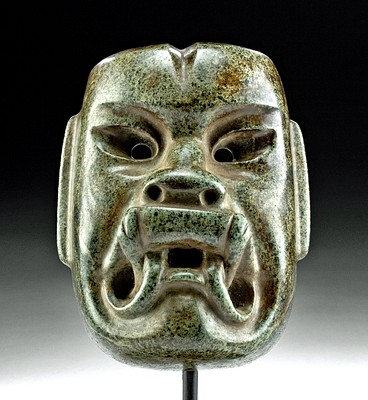19th C. Solomon Islands Wood & Shell Food Bowl - Apira
Lot 266a
About Seller
Artemis Gallery
686 S Taylor Ave, Ste 106
Louisville, CO 80027
United States
Selling antiquities, ancient and ethnographic art online since 1993, Artemis Gallery specializes in Classical Antiquities (Egyptian, Greek, Roman, Near Eastern), Asian, Pre-Columbian, African / Tribal / Oceanographic art. Our extensive inventory includes pottery, stone, metal, wood, glass and textil...Read more
Categories
Estimate:
$32,000 - $48,000
Absentee vs Live bid
Two ways to bid:
- Leave a max absentee bid and the platform will bid on your behalf up to your maximum bid during the live auction.
- Bid live during the auction and your bids will be submitted real-time to the auctioneer.
Bid Increments
| Price | Bid Increment |
|---|---|
| $0 | $25 |
| $300 | $50 |
| $1,000 | $100 |
| $2,000 | $250 |
| $5,000 | $500 |
| $10,000 | $1,000 |
| $20,000 | $2,500 |
| $50,000 | $5,000 |
| $100,000 | $10,000 |
| $200,000 | $20,000 |
About Auction
By Artemis Gallery
Oct 7, 2021
Set Reminder
2021-10-07 10:00:00
2021-10-07 10:00:00
America/New_York
Bidsquare
Bidsquare : Exceptional Antiquities Ethnographic Fine Art
https://www.bidsquare.com/auctions/artemis-gallery/exceptional-antiquities-ethnographic-fine-art-7537
Museum-worthy examples of Egyptian, Greek, Roman, Etruscan, Near Eastern, Far East / Asian, Pre-Columbian, African / Tribal, Oceanic, Native American, Spanish Colonial, Fossils, Ancient Jewelry, Fine / Visual Arts, so much more! Artemis Gallery info@artemisgallery.com
Museum-worthy examples of Egyptian, Greek, Roman, Etruscan, Near Eastern, Far East / Asian, Pre-Columbian, African / Tribal, Oceanic, Native American, Spanish Colonial, Fossils, Ancient Jewelry, Fine / Visual Arts, so much more! Artemis Gallery info@artemisgallery.com
- Lot Description
Oceania, Melanesia, Solomon Islands, Makira Islanders, ca. late 19th to early 20th century CE. An important and incredibly rare ceremonial food bowl carved from wood, painted with charcoal and dark plant sap, and inlaid with dozens of intricate nacre decorations. Known as an apira (apira ni mwani, literally "bowl for men"), these flat-bottomed bowls are filled with food offerings and presented to the ali'i (chiefs and nobility) of the islands. The canoe-shaped design is accentuated with exterior handles shaped like heads of sacred bonito (skipjack) fish with inlaid nacre eyes and spotting. Both bowl faces are adorned with inlaid nacre zigzags, semicircles, and conjoined chevrons resembling abstract birds. When not in use, bowls like this example are suspended from ropes within the village canoe house, known as aofa, with canoes used on headhunting expeditions and reliquary fish containing the skulls of their ancestors. Size: 110" L x 16" W x 14" H (279.4 cm x 40.6 cm x 35.6 cm)
According to the curatorial team at the Cooper Hewitt Museum, "The bonito was a sacred fish, belonging to a wider assemblage of relationships that included the smaller fish that bonito hunt in schools; the birds attracted to the chase; and ancestral beings that took the form of sharks. The first sighting of the bonito each season began a series of rituals during which young initiates were trained to catch these aggressive fish and thus learn about their place within the wider world."
Cf. The Metropolitan Museum of Art, accession number 1979.206.1773; The Brooklyn Museum, accession number 62.29; and The Penn Museum, object number 67-5-1.
Provenance: private Hawaii, USA collection, 1995-2010; ex-Aguttes, Paris (April 7, 2017, lot 629); ex-Todd Barlin collection, Australia, collected in 1998
All items legal to buy/sell under U.S. Statute covering cultural patrimony Code 2600, CHAPTER 14, and are guaranteed to be as described or your money back.
A Certificate of Authenticity will accompany all winning bids.
PLEASE NOTE: Due to recent increases of shipments being seized by Australian & German customs (even for items with pre-UNESCO provenance), we will no longer ship most antiquities and ancient Chinese art to Australia & Germany. For categories of items that are acceptable to ship to Australia or Germany, please contact us directly or work with your local customs brokerage firm.
Display stands not described as included/custom in the item description are for photography purposes only and will not be included with the item upon shipping.
#154888Losses to some inlaid nacre panels, otherwise in excellent condition with great remains of dark pigment throughout.Condition
- Shipping Info
-
All shipping is handled in-house for your convenience. Your invoice from Artemis Gallery will include shipping calculation instructions. If in doubt, please inquire BEFORE bidding for estimated shipping costs for individual items.
-
- Buyer's Premium



 EUR
EUR CAD
CAD AUD
AUD GBP
GBP MXN
MXN HKD
HKD CNY
CNY MYR
MYR SEK
SEK SGD
SGD CHF
CHF THB
THB
















